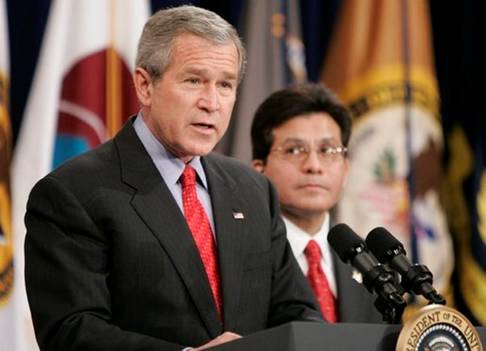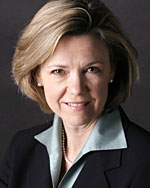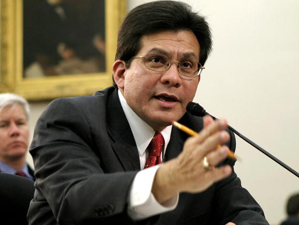|
The Pulitzer Prize ‘Traitors’ Assault on a Vigilant Press in a Time of Secrecy and War By Eve Berliner |
|
|
The
White House President George W.
Bush with Attorney General Alberto Gonzales at his swearing-in ceremony in
February 2005. |
Dana Priest’s
classified revelation of secret CIA “black site” prisons in The Washington
Post won her the 2006 Pulitzer Prize.
Attorney General Alberto
Gonzales testifying before the Senate Judiciary Committee on wartime
executive power and the NSA secret domestic surveillance program. |
|
By Eve Berliner And so it was the
Pulitzer Prize "traitors" who exposed the atrocities of war and the
lies and manipulations of Presidents and thieves. The journalist: enemy of
corruption, subjugation, exploitation.
They bear witness. They bring to light. They hold to account. They are the conscience of the nation, the
journalists of sacred rage. On April 17, 2006, the
Pulitzer Prize in Journalism was awarded to national security reporter Dana
Priest of the Washington Post, for her stunning revelation of secret CIA
"black site" prisons in Eastern Europe, dens of sadistic torture
where others do our dirty work and suspects "disappear" into the
void. Also recipients of the
nation's most prestigious prize, were James Risen and Eric Lichtlam of the
New York Times for their startling expose of the secret, warrantless domestic
eavesdropping program, authorized by the President and carried out by the
National Security Agency, the extent of which continues to mushroom with
incendiary force. In each case, George
Bush personally intervened and urged editors not to publish these explosive
reports. The New York Times, in the interests of "national
security," acceded to the wishes of the White House and withheld the NSA
story for one year. The Pulitzer Board
honored both investigations with the highest honor in journalism, the
Pulitzer Prize. Both stories raise
profound moral questions for America. On the day following the
announcement, Bill Bennett, formerly of the Reagan/Bush administrations, now
CNN commentator, had this to say on his national radio program: "These reporters
took classified information, secret information, published it in their
newspapers, against the wishes of the President and others that they not
release it... As a result are they punished?
Are they in shame? Are they
embarrassed? Are they arrested? No, they win Pulitzer Prizes. I don't think what they did was worthy of
an award. I think what they did is
worthy of jail... "These people who
reveal our secrets, who hurt our war effort, who hurt the efforts of our CIA,
who hurt the efforts of the President's people, they shouldn't be given
prizes and awards for this. They
should be looked into under the Espionage Act." Attorney General Alberto
R. Gonzales had this to say about the Times classified disclosures:
"Obviously our prosecutors are going to look to see all the laws that
have been violated. And if the
evidence is there, they're going to prosecute these violations.” “We have an obligation
to ensure that our national security is protected...We have an obligation to
enforce the law and to prosecute those who engage in criminal activity,"
he told the ABC News program, "This Week." It has now come to light
that accusations of treason and the prospect of criminal prosecution of
reporters is circulating in the back corridors of George Bush's
Washington. There is talk of resurrecting
the provisions of the Espionage Act of 1917, the focus of which was spies not
newspapers. The antagonism between
government and the press has long been fueled by the hunting down and firing
of high government leakers of classified material and subpoenas and
imprisonment of reporters to force disclosure of confidential sources. The criminal prosecution
of journalists under the espionage laws would alter the nature of our
democracy, the rules of engagement between government and press, the public's
right to know. It would virtually shut
down dissent. The focus no longer
would be the leaker but the disseminator of the message, the press
itself. "I'm not sure
journalists fully appreciate the threat confronting us," Bill Keller,
executive editor of The New York Times, wrote in an e-mail to Murray Waas of
The National Journal. "The Times
in the eavesdropping case, The Post for its CIA prison stories, and everyone
else who tried to look behind the war on terror...Maybe some people are a
little intimidated by the way the White House plays the soft-on-terror
card... "Some officials in
this administration, and their more vociferous cheerleaders, seem to have a
special animus towards reporters doing their jobs. There's sometimes a vindictive tone in the way
they talk about dragging reporters before grand juries and in the hints that
reporters who look too hard into the public's business risk being branded
traitors...[S]ome days it sounds like the administration is declaring war at
home on the values they profess to be promoting abroad." The seminal event of
journalistic courage occurred in 1971 when New York Times publisher Arthur
Ochs Sulzberger, stood his ground, despite dire warnings and cries of
treason, and fought Richard Nixon all the way to the Supreme Court for the
right to publish The Pentagon Papers, the government's top-secret study of
the Vietnam War that exposed the long classified history of lies, deceptions
and misjudgments that sucked the nation into the quagmire of Vietnam. In 1972, the Pulitzer
Prize was awarded to The New York Times for its "distinguished example
of meritorious public service by a newspaper for the publication of The
Pentagon Papers." The Pulitzers have a
long history of honoring greatness and guts. In the end, The New York
Times and The Washington Post who had joined in the litigation, served
journalism and served the nation. But ominous events
continue to unfold. Cries of treason
escalate daily with the further disclosure by the New York Times, the Wall
Street Journal and the LA Times of a secret government surveillance program
of international banking records, a revelation condemned by the president as
“disgraceful,” and decried by Vice President Cheney with vehemence. New York
Republican congressman, Peter King, chairman of the House Homeland Security
Committee, has called openly for criminal prosecution of the Times under the
Espionage Act and the National Review has asked the White House to revoke the
newspaper’s press credentials. The soul of America
darkens, something tainted seeping into the American consciousness, America
the beautiful, purple mountain majesties, such shining ideals. Where art thou? We maintain faith in the
First Amendment to the Constitution, the bulwark of democracy. Free speech and a free
press. And if it is war on the
press, if the press is under surveillance, if there is a witch hunt, we will
not go down with the silence of the lambs. The journalist is the
guardian of the public trust. The journalist is the
conscience of the nation. |
|


